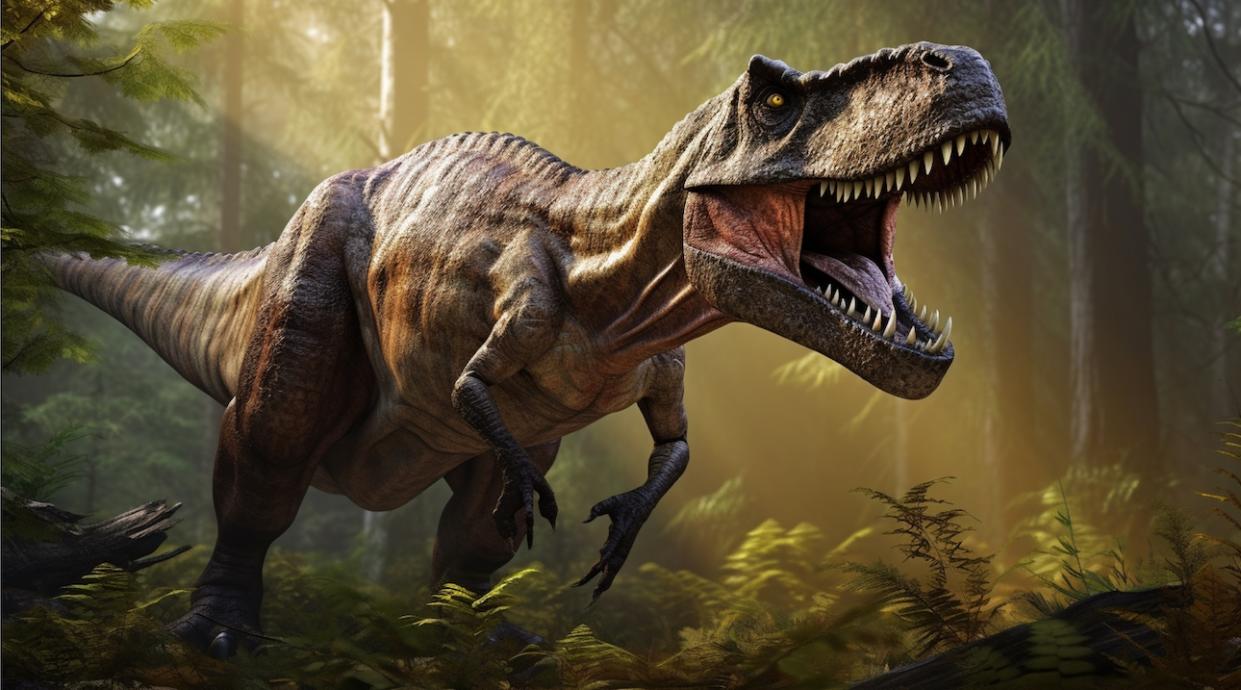T. rex was as smart as a crocodile, not an ape, according to study debunking controversial intelligence findings

Since the 1970s, most scientists have agreed that Tyrannosaurus rex was about as smart as modern reptiles.
Then, in 2023, a study by a Brazilian neuroscientist argued that T. rex had a cognitive intelligence closer to that of primates. Could this iconic dinosaur have been as smart as a baboon, or even a human?
Probably not, finds a new study published in the journal The Anatomical Record. The international team of scientists reaffirmed the older understanding that T. rex intelligence was likely similar to that of a crocodile.
"This traditional view is likely the right one," first author Kai Caspar, a zoologist at Heinrich Heine University Düsseldorf in Germany, told Live Science. Caspar studies how cognition evolves and the different cognitive capacities between animal groups.
To study brain biology in long-extinct animals like dinosaurs, scientists use endocasts — or molds of the fossil skull — to estimate relative brain size and the proportion of tissue that it once held. It's not a perfect proxy, but currently it's the best model.
In modern alligators and crocodiles, the brain only occupies about 30% of the cranial cavity. In birds and mammals, it's close to 100%.
Related: Never mind outrunning a T. rex — you could probably outwalk it
According to Caspar and his colleagues, this was one of the main problems with the 2023 study: that it overestimated the brain size of T. rex by assuming the brain filled the whole endocranial cavity. Given the shape and form of the dinosaur endocasts available to study, Caspar said the brain-to-fluid ratio was likely closer to that of reptiles than that of modern birds.
The second problem was data inconsistency. Brain size estimates in the Brazilian study included other structures in the T. rex head that sit inside the brain cavity but aren't part of the brain itself, such as the olfactory bulb. The data also used a mix of juvenile and adult T. rex samples.
In the new study, Caspar and colleagues tidied up the dataset by standardizing body mass estimates and excluding those structures inside T. rex's skull that aren't involved in neural activity, like the olfactory bulb, pituitary gland and inner ear.
But they couldn't replicate the results of the 2023 study.
"We arrived at very different results," said Caspar.
They estimated the number of neurons, or nerve cells, in the T. rex brain using their new brain volume estimates.
They found T. rex had between 250 million and 1.7 billion neurons, similar to the count in crocodiles. The Brazilian study, in contrast, estimated 3.3 billion neurons for T. rex, similar to that of baboons.
However, the study notes that brain size and neuron count aren't the best predictors of cognitive intelligence. The number of neurons and brain size varies greatly across animals, but it doesn't always correlate to higher competence.
For example, pigeons have little brains and high neuron density and can count as well as monkeys with a larger brain.
"Neuron counts have not proven themselves to be very good predictors of intelligence in modern animals. So why should we assume that they are for extinct ones?" Caspar said.
Related: Indian crocodiles seen saving dog from feral pack attack, but scientists divided over what it means
Even though T. rex probably had the intelligence of a crocodile, Caspar said not to consider it a downgrade from primate-level intelligence.
RELATED STORIES
—'Frightful' never-before-seen tyrannosaur might be the 'missing link' in T. rex evolution
—Why did T. rex have such tiny arms?
—T. rex had thin lips and a gummy smile, controversial study suggests
A whole range of dinosaur behaviors have been lost to time and understanding more about T. rex brain biology can help inform the study of modern reptiles, said Caspar.
"To say that dinosaurs resembled living reptiles in their cognition doesn't mean that they were boring animals," he said. "Reptiles can be fascinating as well."

